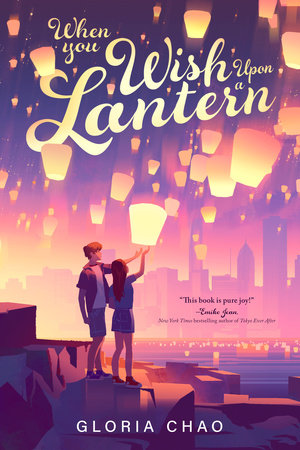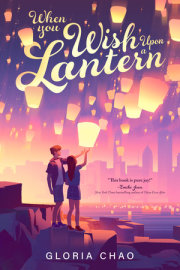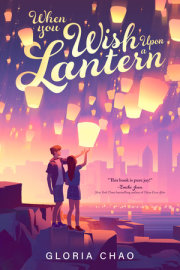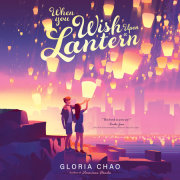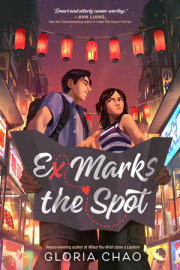Schloop
If there was ever to be magic found on this Earth—this sometimes wretched, unremarkable Earth—it’s when I’m standing on the shore of Lake Michigan, the cold water dancing with my bare toes, and I’m looking at a lit-up sky. It’s not alight with stars or fireworks or a big, bright full moon, but lanterns. Paper lanterns with people’s wishes written on the side, carried into the never-ending dark night by a fire inside that matches the fire inside the sender’s heart. What could be more magical than a sky aglow with wishes and dreams?
There are many names for this miniature hot-air balloon—sky lantern, tiāndēng (a.k.a. “sky light,” translated literally)—but my favorite is the one my family’s Chinatown shop, When You Wish Upon a Lantern, has coined for our community: wishing lanterns. Because to us, the wish you write on it is the most important part.
Today is the first day of summer, June 21, and for the tenth year in a row, the Chicago Chinatown community has gathered at Promontory Point, a peninsula that juts out into the lake with big grassy areas, firepits, views of downtown, and large stone ledges leading down to the waves crashing against the shore. We’re here to celebrate a tradition started by my family’s little shop that could, which is fifty-one years old and responsible for two new holidays and many, many wishes being granted. In less than an hour, we will light up the sky.
Currently, my parents are managing the table we’ve set up with lanterns for sale, lighters, and markers.As I approach them to help out, I notice an additional person nearby assisting the surrounding customers. And he knows how to manipulate the sometimes-finicky lanterns as well as I do.
Kai Jiang.
Oh no.
His presence stops me cold. The shock of straight, unruly black hair that’s often falling into his eyes, the confident yet humble walk, the lean forearm muscles honed from hours of kneading dough in his family’s Chinatown bakery, Once Upon a Mooncake . . . all of that would be enough to stop anyone cold when they see him, but for me? I halt because I have quite the
oh no history with him, which I attempt to put out of my mind as he gives me a brief, deliberate, right-left wave from several feet away. I try not to let the chilliness of his gesture freeze my insides, but it’s all I can think about.
Before, we were childhood best friends, constantly playing together in the alley shared by our family’s neighboring businesses. Then, more recently, he started becoming
Kai, as in Kai with the infectious laugh and defined arms and delicious buns (I’m talking about the breads he bakes, okay?). But before I could figure out what all that meant . . .
I threw up on him. A few months ago. We were having a blast sipping boba tea at the café closest to our shops when he made me laugh so hard that I snorted a boba ball up into my nose (yes, I know, I’m cringing too).
Schloop, out everything came. On the table, in my lap, on him. So much on him. I died a little that day. Afterward, I was so embarrassed I steered clear of him for a couple of weeks, even telling my parents I was sick so I wouldn’t have to go to our store and risk running into him. But I didn’t mean for it to last forever. Somehow the avoidance snowballed, and we’ve barely seen each other since. Perhaps he’s keeping a six-foot splash zone between us (
if it’s good for viruses, it’s good for vomit kind of thinking). Orperhaps he isn’t who I thought he was, given that he let thatincident come between us. Or perhaps the awkwardness of it all is just too much, and every time he looks at me, he sees boba coming out of my nose. Whatever it is, I miss my friend.
Before I manage to give Kai a return wave, my father says, “Kai, thank you, but Liya’s here. You should go join your friends.”
My mother narrows her eyes at my dad. Then she calls after Kai, “Thank you so much for your help!”
I say nothing as I join them at the table.
“I’ve told you,” my father says to me, “to be careful of him. His family . . .”
His family, his family, his family. I tune him out. My father’s feud with the Jiangs is bordering on obsession now.
Their trash smells worse than ours. They don’t respect our half of the alley. They filled our shared dumpster with spoiled dough, and when it rose, the dumpster exploded. I guess it was for the best that I never figured out my feelings for Kai because the Jiangs and Huangs were becoming the Montagues and Capulets, the Hatfields and McCoys of Chinatown. And all because of garbage.
We didn’t have any issues with the Jiangs before this year thanks to my paternal grandmother, the peacekeeper. But after Nǎinai passed away six months ago, every dumpster incident has led to a heated argument. Now the feud is all my father talks to me about, partly because he’s avoiding the one thing we really should be talking about. And on today of all days, I’m so annoyed that I do dare to bring up the forbidden topic.
“It’s the first Summer Lantern Festival without Nǎinai.”
The festival she created. “Can we just . . . have a moment of silence for her?”
That softens him. “I miss her too, Lili.” His use of Nǎinai’s nickname for me stirs up too many emotions. I busy myself by straightening the items on the already well-organized table.
Ya-ya would be the more common nickname for someone with my Chinese name, Lí Yǎ (the tradition is to repeat the last character), but Nǎinai always thought the
lí part of my name fit me more than the
yǎ. Together, lí yǎ means “will be graceful,” but
lí by itself has several definitions, and Nǎinai always thought its meaning of “dark” fit me better because it made her think of the dark night sky we love—loved—to look at together. “You are the night sky that other people can shine against,” she used to tell me, her own dark brown eyes shining. “That’s why you’re so special. You put others first and make them shine, and there are very few people in the world who do that.”
“Liya?” my mother says cautiously, breaking into my thoughts. Concern seeps from her narrowed eyes and tight jaw. “Are you . . .” She can’t even finish that simple question.
I wish she would stop treating me like cracked glass, but I also don’t want to tell her I’m okay when I’m not sure what I am. Since Nǎinai was more of a parent to me than my mom or dad, they don’t seem to know how to step up now. After Nǎinai passed, my parents began tiptoeing around me, afraid to make things worse or remind me too much of her, and their tiptoeing has only increased over time. I wish I could tell them what I needed, but I have no clue myself. I guess my wish is for them to just know what I need, the way Nǎinai would have, and to just do it. My worst fear is that they’re right: I’m on the verge of breaking. Without Nǎinai, without Kai, and (in the important ways) without my parents, I’ve never felt as alone as I do now.
I swallow hard, swallowing my emotions down with my saliva. “What do you need help with?” I ask them.
“We’re fine here,” my father says.
My mother suggests, “Why don’t you join the festivities?”
“But not with him,” my father adds quickly. And sternly.
If Nǎinai were here, she would defend Kai. “He’s a good kid, the best! Have you seen how kind he is to his family?”
Even the ones who don’t treat him well usually went unsaid. “And have you seen how hard he works in the bakery?”
Working his buns off on the buns, I would always add,and Nǎinai would roar with laughter, her deep, resonant chuckles filling the air with her distinctiveha-has that I always loved because she literally said
ha-ha over and over when she laughed, like it was so funny and she was so happy that she had to enunciate each syllable perfectly.
My mother grabs a lantern and pushes it into my hand. “Why don’t you make a wish tonight?” Her voice lowers and she struggles to get the next words out. “For . . . her. She’d want you to.”
I do have a wish I want to send into the universe. But I don’t want to do it alone. I also don’t want to do it with my parents. Nǎinai and I had many things that were just ours, and our biggest just-us tradition revolved around the wishing lanterns. I haven’t figured out how to do this (or anything, really) without her yet, how to fill that hole, or if I even want to. Her last words to me were
Don’t be afraid. But I’ve been afraid for so long, ever since she fell ill, and I don’t remember how to feel anything else.
I take the lantern, and instead of grabbing one of the markers on the table, I take Nǎinai’s calligraphy set out of my backpack. My father smiles at me. I force one back at him.
“I’ll still help people with their lanterns,” I tell them.
They give me absentminded nods, distracted byapproaching customers.
When I turn away from the table, my eyes land on Shue Nǎinai. Even though none of us are her grandchildren, the community calls her
nǎinai because she loves us all like family and is constantly watching other people’s kids or handing out fresh homemade scallion pancakes (the thick, circular, flaky kind that requires mad skills). She lost her husband decades ago, and her children are grown and have moved away.
She’s currently standing with Daniel, the young chef who owns the trendy French-Chinese fusion restaurant around the corner from When You Wish Upon a Lantern. When Shue Nǎinai catches my eye, she waves me closer. I wasn’t going to interrupt, but then Daniel also begins waving me over frantically. Once I’m within earshot, I hear Shue Nǎinai mention a pot, and I immediately know she’s telling Daniel about her gift to the community’s most recent newlyweds, who moved into the apartment building down the street to attend graduate school at nearby UIC. I can practically recite the story for her: “I saw a top-notch pot for sale and it said ‘good pot’ on the side in nice lettering. So of course I bought it—it has to be good! It says so on it! But then, you’ll never guess this, when I gave it to them, they laughed because they say
pot has another meaning! Did you know that? They think it’s so funny, the double meaning, but all I can think is, English has nothing on Mandarin. We have so many homophones and clever idioms, and we take them seriously. We’re the masters of puns! Even our traditions are based on double meanings, like how we eat fish for the New Year because ‘fish’ is a homophone for ‘surplus’!”
I know her stories better than the back of my hand (because let’s be honest, I don’t think I could pick my hand out of a lineup).
As soon as I join them, Daniel pats me on the back and darts off. He had given me
thank you for saving me eyes that I have sadly received often when joining a Shue Nǎinai conversation. People say she tends to go on. I shake it off and hope Shue Nǎinai didn’t see, then I focus on her. She’s a good, if long-winded, storyteller, so I don’t mind as she, apropos of nothing, launches into the umpteenth iteration of how she met her husband.
One thing is different this time though. As she talks, her tone is less sad, more nostalgic. Her eyes are clear and hopeful, not clouded with tears. She confirms my observations when she finishes the story on a completely different note than in the past. Instead of talking about how much she misses her late husband or her kids, she says, “If I found love once, I might again, right?”
It’s so sweet I want to hug her. But I merely give Shue Nǎinai a smile and a “Yes!” that is emphatic but not as emphatic as I feel on the inside. It’s not in my DNA to show what I’m feeling. Or I guess, more accurately, I’ve conditioned myself to hold back my full reactions to most things. It started in fifth grade when Mrs. Hearn told the class that Stephanie Lee had won a spelling bee and I clapped enthusiastically, only to realize moments later that she had actually said, “Stephanie Lee was stung by a bee.” Then, as I sat on my hands and scrunched my eyes closed, Mrs. Hearn proceeded to tell everyone how Stephanie was extremely allergic but luckily had an EpiPen, which her mother jammed into her thigh right before the ambulance arrived to speed her to the hospital. Stephanie was fine in the end, thank god, but when I opened my eyes, the other kids and even Mrs. Hearn were still staring at me. I had never wanted so much for the earth to swallow me up. I felt horrible, and I suspect everyone else thought I was horrible too, especially Stephanie if she heard about what happened (and given the tight-knit community we live in, she definitely heard).
I relive that memory all the time. Almost as much as I relive the boba one. Now I keep my feelings to myself, and everything I do is from the background, hiding behind lanterns or a blank face. The only person I could be myself around was Kai, pre–boba incident. Post, I’m just as awkward as with everyone else, maybe even more so. I’m usually embarrassed about my need to hide in the shadows, but Nǎinai used to make me feel better. “You are the night sky that other people can shine against.” She viewed my fault as a strength. It made me feel invincible. Special. Loved. But now that she’s gone, I just feel small.
“I hope you make a wish for yourself tonight,” I tell Shue Nǎinai.
Copyright © 2023 by Gloria Chao. All rights reserved. No part of this excerpt may be reproduced or reprinted without permission in writing from the publisher.

